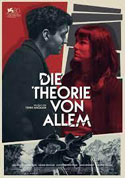

Opening 26 Oct 2023
Directed by:
Timm Kröger
Writing credits:
Roderick Warich, Timm Kröger
Principal actors:
Jan Bülow, Olivia Ross, Hanns Zischler, Gottfried Breitfuss, David Bennent
Hamburg, Germany, 1974: the TV-moderator (Dirk Böhling) postures a theory so different to Johannes Leinert’s (Jan Bülow) best-selling book’s—an alternate world—the author walks offset. Director-co-writer Timm Kröger and Roderick Warich’s screenplay then backtracks 12 years to the Alps where an adolescent boy (Jonathan Wirtz) and girl (Vivienne Bayley) are sledding; ominous clouds form, a mountain emits a deep-bellied rumble and subsequently they are in a scary tunnel.
Abruptly, the film switches to a young eager Johannes, a doctoral physics student, embarking with his supervisor, the learned Herr Doctor Strathen (Hanns Zischler), to a physics congress in Switzerland. Enroute, the bombastic and oftentimes rude Prof. Blumberg (Gottfried Breitfuss) boards the train and then bores them. At the Alpine hotel the guest speaker, an Iranian scientist, does not arrive; Dr. Strathen decides they will nevertheless remain. When Johannes accidently meets Karin (Olivia Ross), a jazz pianist, his world seems to mysteriously tip. There is an avalanche of unexplainable events, an unaccountable and grisly death, children in hospital, and on and on. The character that seems most consistent in its actions is the environment, which even at its scariest and/or enigmatic is majestic to behold.
The actors fail to raise any emotional connection to their characters, whereby audiences feel no attachment nor care what happens to them. But then Warich and Kröger’s convoluted screenplay staggers between the classic 1940s/1950s noir drama’s complex plots that emphasize cynical attitudes and motivations yet stayed on point and had clarifying flashbacks and motivations. Die Theorie von Allem storyline, by contrast, unsuccessfully inserts the theory of parallel universes that its depiction renders elusive and incomprehensible. The film’s length only accentuates the storyline’s confusion/gaps, although it does meet aesthetic perimeters.
Just because Roland Stuprich’s (outstanding) cinematography is in black/white does not make this a film noir. Diego Ramos Rodriguez and David Schweighart’s felicitous score loses its effectiveness through overuse, which evinces Jann Anderegg’s blatant heavy-handed editing. Die Theorie von Allem’s many good elements, and the script’s attempt to intertwine classic filmmaking elements and the modern parallel worlds concept was a bold undertaking by Kroger. Their entanglement emphasizes nonfulfillment that leads to confusion leading to a ponderous too-long film – too bad. (Marinell Haegelin)